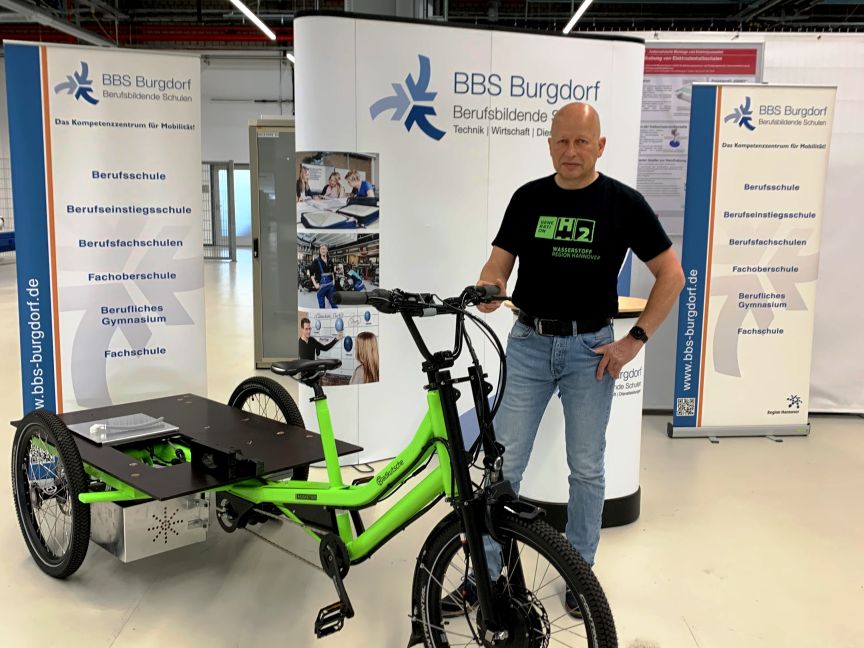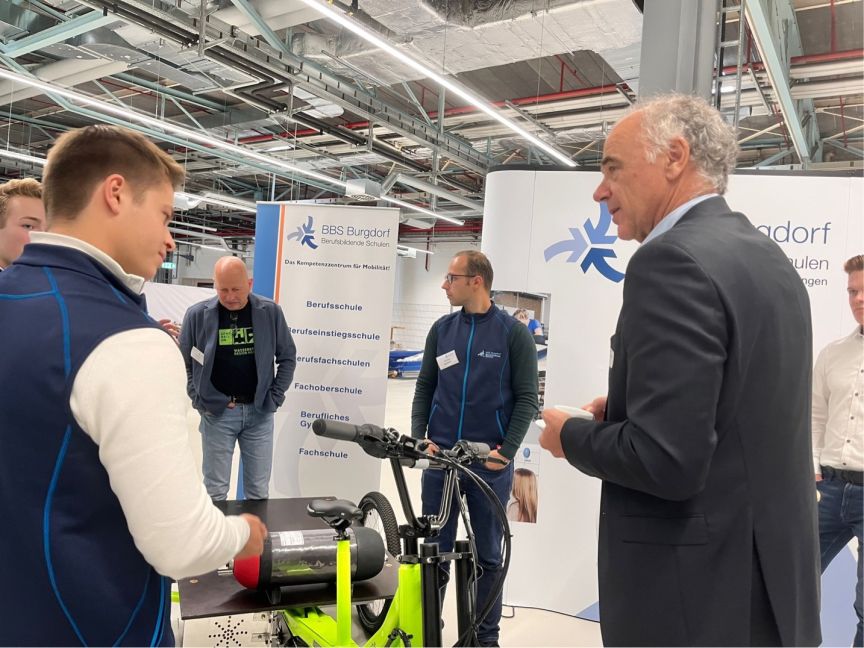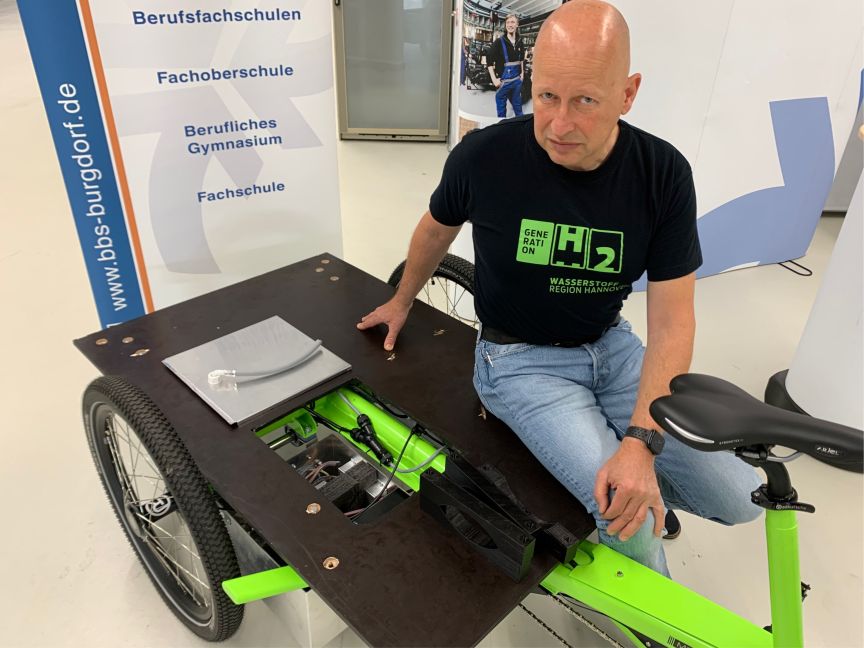Successful training program for active companies in the hydrogen sector
 © BBS Burgdorf
© BBS Burgdorf Christoph Falkner is head of the vehicle technology department at BBS Burgdorf and is responsible for all dual training occupations in this area. Among other things, Mr. Falkner teaches vehicle technology at the technical school and commercial vehicle technology for automotive mechatronics technicians. In 2022, Mr Falkner successfully participated in the joint further training program "Hydrogen for specialists and managers" of Leibniz Universität Hannover, Carl von Ossietzky Universität Oldenburg and the Fraunhofer Institute for Wind Energy Systems (IWES). The training program is funded by the Hannover Region Economic and Employment Promotion Agency , among others, and trains qualified specialists for the use of green hydrogen in companies .
 © BBS Burgdorf
© BBS Burgdorf Mr. Falkner, you are a teacher of automotive engineering and sport at BBS Burgdorf. What is the connection to hydrogen in your professional environment?
BBS Burgdorf is one of the "lighthouses for alternative drives" in Lower Saxony. We have been working on e-drives for years, but also on alternatives to car traffic - bicycles, pedelecs, rail-bound traffic and much more. Hydrogen appears to have great potential for use as an energy source in the defossilization of previously combustion engine-driven transport, especially for high loads and long distances. Just as hydrogen is suitable as a raw material for e-fuels, which can be a bridging technology in the transition to emission-free drives. An energy transition is linked to a transport transition , which we would like to help shape.
How did you hear about the Hannover Region's business and employment promotion program?
At the beginning of 2022, we planned a hydrogen-powered cargo bike as a project for our automotive engineering college in cooperation with the company JAG. Initial reporting on this project in the HAZ newspaper brought us to the attention of the Hannover Region Economic Development Agency. After an initial meeting with Dr. Oliver Brandt, Dr. Mahzad Peschke and Ms. Tanja Göbler, we very quickly realized that we were on the same wavelength with regard to the topic, and our project fits in very well with the region's other hydrogen projects in the Generation H2 project - so cooperation was an obvious choice.
How has the cooperation with the Hannover Region Economic and Employment Promotion Agency developed?
As part of the cooperation, the Hannover Region approached us at the start of the 2022 school year and offered us a place on the "Hydrogen for Specialists and Managers" continuing education program at the University of Oldenburg . After a brief examination of the framework and content, I accepted this offer practically without hesitation - knowing full well that, as a representative of an educational institution, I would be one of the exotic students on the course. However, the announced course content suggested that I would gain a comprehensive and in-depth insight into technology, the legal framework and the landscape of players - which should help me to make a more professional assessment of the subject area and provide a basis for evaluating the usefulness of H2 technologies .
 © BBS Burgdorf
© BBS Burgdorf What were your reasons for opting for further training?
We are already involved in many areas relating to hydrogen at BBS Burgdorf and are developing, for example, a cargo bike as an alternative and sustainable transportation solution for (commercial) intensive users. There are also other project ideas, such as the construction of a velomobile with a methanol fuel cell.
We are also developing a competence center for green hydrogen - this project actually stems from the insights we gained during our studies. We believe it is important to introduce young people to the topics of the energy industry, sustainability and hydrogen potential on the educational side. On the one hand, it is about arousing interest and reducing reservations , and on the other hand, it is about laying a professional foundation now for professions and activities in which hydrogen is already an issue. The first commercial vehicles and cars are already in the workshops, just as the first hydrogen trains are running and need to be serviced. The target group is not only our own educational programs up to vocational high school, but also students from general education schools, to whom we would like to be available as an educational partner in this field.
We also focus on implementing sustainability and hydrogen issues in the curricula of our training courses by raising awareness in the continuing education program .
What is the most important thing you took away from the "Hydrogen for specialists and managers" training course?
In general: the realization that hydrogen is not an end in itself, but that there is no alternative to it as a storable energy carrier and raw material if we really want to achieve CO2 neutrality and say goodbye to fossil fuels and raw materials. However, this is linked to the massive expansion of renewable energies, as well as the development of an awareness of the need to conserve energy and raw materials. For the curriculum work, the focus is naturally on technical points and safety aspects - nevertheless, we attach great importance to conveying the connections in the energy chains and ecological contexts. Education for sustainability is in any case an overriding goal that we have to fulfill.
How has the training program changed your view of hydrogen as a teacher at BBS Burgdorf?
For me, the charm of the course lies in the fact that the target group is open to everyone from academics to master craftsmen. Every larger or medium-sized company that deals with heating technology, mobility or energy technology, for example, would be well advised to equip at least one employee with the skills taught on the course. However, the contextual knowledge imparted would also be well placed in authorities or credit institutions that deal with the approval or financing of systems.
What would you recommend to others who are interested in the "Hydrogen for specialists and managers" course?
For me, the study confirmed my previously amateurish assessment of the H2 potential. However, it also became clear that for a transition to climate neutrality and the "hydrogen era", there must be considerable political will, a corresponding legal framework must be created and a lot of money must be invested for a ramp-up.
My tip for prospective students: Don't take on too much else for half a year - and use the potential of teamwork and interdisciplinary work!
Then please get in touch with our contact person (see Contact)
or
Dr. Ruggero Capperucci
Continuing education management Hydrogen certificate program
h2@uni-oldenburg.de
Tel. 0441 / 798 5046
Further information is also available on the website at https://uol.de/weiterbildung-wasserstoff

Contact us
Dr. Mahzad Peschke
Hanover Region
Employment Promotion
Department of Economic and Employment Promotion

